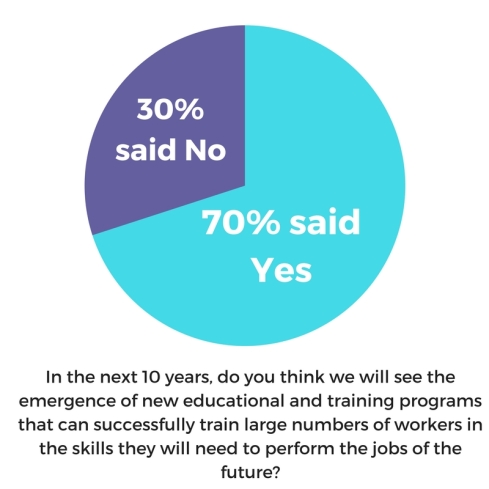Multimedia reporting by Diego Pineda
The development of artificial intelligence in the past years has expanded so much that the smartphones people carry in their pockets today are more powerful than the computers used in the exploration of the moon.
Because of this growth in technology, Janna Anderson, professor of communications and director of Elon University’s Imagining the Internet Center, believes people need to be unafraid to move forward in the upcoming changes of artificial intelligence and robots.

“It is important for us to be adaptable, be resilient, be able to work in teams, be able to be great leaders and understand the technology,” Anderson said.
Anderson was the co-author of a recent report on the future of job skills and jobs training through the Pew Research Center and the Imagining the Internet Center. This report included the answers of 1,408 technologists, futurists, and scholars. It found that most experts expect that education and job-training ecosystems will shift in the next years to use new virtual and augmented reality tools.
According to a news release of this report, 70 percent of those surveyed said that they do expect the emergence of new educational and training programs that will train workers in the skills they will need to perform the jobs of the future. 30 percent said that there will not be successful programs since adaptation in these environments will not be sufficient to prepare these workers.
Freshman Elena Polin agrees with the 30 percent that disagreed with the emergence of training and educational programs for workers in the future.
“In this day in age, technology is always advancing and people could be left behind,” Polin said.”We need to pay robots to do the work themselves.”

Polin says that though technology like robot machines will take up the workforce in the future, she acknowledges that humans bring a special element.
“Humans bring charisma and opinions and new ideas and robots cannot do that,” Polin said.
Whether or not humans will be able to keep up and adapt to emerging technologies is up to debate. Anderson’s report identified five themes from the overall responses of people they surveyed. These themes were that the training ecosystem will evolve with a mix of innovation in all education formats, learners mus cultivate 21st century skills, new credentialing systems will arise as self-directed learning expands, training and learning systems will not meet 21st-century needs by 2026 and technological forces will fundamentally change work and the economic landscape.
Sophomore Lexy Roberts says that humans will be able to work with technologies if they learn to do so
“There are some skill sets that are so mundane that you can teach a machine to do them,” Roberts said. “But with the skills earned with artificial intelligence, there is something about the way that we process things that you cannot teach a machine to do.”

Roberts says that a skill that is essential for those in the workforce is having “an eye for creativity.” She says that robots will never be able to have a creative mindset, but they will only require repairs while humans require health insurance needs and a salary.
In contrary to Roberts, freshman Aminata Harris, believes that though human emotions and perspectives matter, they may not be as relevant in the future.
“At some point, human beings are not going to be as special,” Harris said. “If there is good enough technology, a robot can really fulfill a job that human beings do.”

Regarding the emergence of training programs, Harris and Roberts both agree that they are needed for humans to partner with technologies in the workforce.
Sophomore Asher Thompson sees a shift happening in as virtual and augmented realities are created especially to do more STEM jobs in maintain and creating those technologies.
He believes that advanced technologies have more capabilities than a regular worker who has a creative mindset.

“Robots have the ability to do mind numbing tedious work extremely efficiently and effectively,” Thompson said. “They are able to process large amounts of data faster.”
For Thompson, the only skills humans need to maintain their jobs and work along with technology is to work hard to remain relevant and up to date with all the skills and programs the job entails.
Anderson’s report showed that there are uncertainties about the coming years in regards to how well workers need to be prepared to keep up with artificial intelligence told and if market capitalism will survive.
Among the skills that the respondents believe will be of value were adaptability, resilience, empathy, compassion, judgement, deliberation, conflict resolution and the capacity to motivate, mobilize and innovate.

Shawn Tucker, associate professor of art, believes that out of all those attributes, adaptability is most important.
“Adapting is people’s only alternative,” Tucker said. “People need to be able to be flexible and open themselves up to new challenges and new opportunities.”
